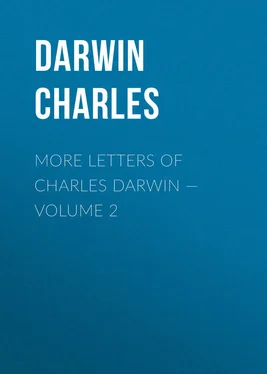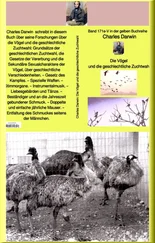Charles Darwin - More Letters of Charles Darwin — Volume 2
Здесь есть возможность читать онлайн «Charles Darwin - More Letters of Charles Darwin — Volume 2» — ознакомительный отрывок электронной книги совершенно бесплатно, а после прочтения отрывка купить полную версию. В некоторых случаях можно слушать аудио, скачать через торрент в формате fb2 и присутствует краткое содержание. Жанр: foreign_antique, foreign_prose, на английском языке. Описание произведения, (предисловие) а так же отзывы посетителей доступны на портале библиотеки ЛибКат.
- Название:More Letters of Charles Darwin — Volume 2
- Автор:
- Жанр:
- Год:неизвестен
- ISBN:нет данных
- Рейтинг книги:5 / 5. Голосов: 1
-
Избранное:Добавить в избранное
- Отзывы:
-
Ваша оценка:
- 100
- 1
- 2
- 3
- 4
- 5
More Letters of Charles Darwin — Volume 2: краткое содержание, описание и аннотация
Предлагаем к чтению аннотацию, описание, краткое содержание или предисловие (зависит от того, что написал сам автор книги «More Letters of Charles Darwin — Volume 2»). Если вы не нашли необходимую информацию о книге — напишите в комментариях, мы постараемся отыскать её.
More Letters of Charles Darwin — Volume 2 — читать онлайн ознакомительный отрывок
Ниже представлен текст книги, разбитый по страницам. Система сохранения места последней прочитанной страницы, позволяет с удобством читать онлайн бесплатно книгу «More Letters of Charles Darwin — Volume 2», без необходимости каждый раз заново искать на чём Вы остановились. Поставьте закладку, и сможете в любой момент перейти на страницу, на которой закончили чтение.
Интервал:
Закладка:
Charles Darwin
More Letters of Charles Darwin — Volume 2 / A Record of His Work in a Series of Hitherto Unpublished Letters
VOLUME II. DEDICATED WITH AFFECTION AND RESPECT, TO SIR JOSEPH HOOKER IN REMEMBRANCE OF HIS LIFELONG FRIENDSHIP WITH CHARLES DARWIN "You will never know how much I owe to you for your constant kindness and encouragement" CHARLES DARWIN TO SIR JOSEPH HOOKER, SEPTEMBER 14, 1862
MORE LETTERS OF CHARLES DARWIN
VOLUME II
CHAPTER 2.VII. — GEOGRAPHICAL DISTRIBUTION
LETTER 378. J.D. HOOKER TO CHARLES DARWIN. Kew, January 20th, 1867.
Prof. Miquel, of Utrecht, begs me to ask you for your carte, and offers his in return. I grieve to bother you on such a subject. I am sick and tired of this carte correspondence. I cannot conceive what Humboldt's Pyrenean violet is: no such is mentioned in Webb, and no alpine one at all. I am sorry I forgot to mention the stronger African affinity of the eastern Canary Islands. Thank you for mentioning it. I cannot admit, without further analysis, that most of the peculiar Atlantic Islands genera were derived from Europe, and have since become extinct there. I have rather thought that many are only altered forms of existing European genera; but this is a very difficult point, and would require a careful study of such genera and allies with this object in view. The subject has often presented itself to me as a grand one for analytic botany. No doubt its establishment would account for the community of the peculiar genera on the several groups and islets, but whilst so many species are common we must allow for a good deal of migration of peculiar genera too.
By Jove! I will write out next mail to the Governor of St. Helena for boxes of earth, and you shall have them to grow. Thanks for telling me of having suggested to me the working out of proportions of plants with irregular flowers in islands. I thought it was a deuced deal too good an idea to have arisen spontaneously in my block, though I did not recollect your having done so. No doubt your suggestion was crystallised in some corner of my sensorium. I should like to work out the point.
Have you Kerguelen Land amongst your volcanic islands? I have a curious book of a sealer who was wrecked on the island, and who mentions a volcanic mountain and hot springs at the S.W. end; it is called the "Wreck of the Favourite." (378/1. "Narrative of the Wreck of the 'Favourite' on the Island of Desolation; detailing the Adventures, Sufferings and Privations of John Munn; an Historical Account of the Island and its Whale and Sea Fisheries." Edited by W.B. Clarke: London, 1850.)
LETTER 379. TO J.D. HOOKER. Down, March 17th, 1867.
It is a long time since I have written, but I cannot boast that I have refrained from charity towards you, but from having lots of work...You ask what I have been doing. Nothing but blackening proofs with corrections. I do not believe any man in England naturally writes so vile a style as I do...
In your paper on "Insular Floras" (page 9) there is what I must think an error, which I before pointed out to you: viz., you say that the plants which are wholly distinct from those of nearest continent are often very common instead of very rare. (379/1. "Insular Floras," pamphlet reprinted from the "Gardeners' Chronicle," page 9: "As a general rule the species of the mother continent are proportionally the most abundant, and cover the greatest surface of the islands. The peculiar species are rarer, the peculiar genera of continental affinity are rarer still; whilst the plants having no affinity with those of the mother continent are often very common." In a letter of March 20th, 1867, Sir Joseph explains that in the case of the Atlantic islands it is the "peculiar genera of EUROPEAN AFFINITY that are so rare," while Clethra, Dracaena and the Laurels, which have no European affinity, are common.) Etty (379/2. Mr. Darwin's daughter, now Mrs. Litchfield.), who has read your paper with great interest, was confounded by this sentence. By the way, I have stumbled on two old notes: one, that twenty-two species of European birds occasionally arrive as chance wanderers to the Azores; and, secondly, that trunks of American trees have been known to be washed on the shores of the Canary Islands by the Gulf-stream, which returns southward from the Azores. What poor papers those of A. Murray are in "Gardeners' Chronicle." What conclusions he draws from a single Carabus (379/3. "Dr. Hooker on Insular Floras" ("Gardeners' Chronicle," 1867, pages 152, 181). The reference to the Carabidous beetle (Aplothorax) is at page 181.), and that a widely ranging genus! He seems to me conceited; you and I are fair game geologically, but he refers to Lyell, as if his opinion on a geological point was worth no more than his own. I have just bought, but not read a sentence of, Murray's big book (379/4. "Geographical Distribution of Mammals," 1866.), second-hand, for 30s., new, so I do not envy the publishers. It is clear to me that the man cannot reason. I have had a very nice letter from Scott at Calcutta (379/5. See Letter 150.): he has been making some good observations on the acclimatisation of seeds from plants of same species, grown in different countries, and likewise on how far European plants will stand the climate of Calcutta. He says he is astonished how well some flourish, and he maintains, if the land were unoccupied, several could easily cross, spreading by seed, the Tropics from north to south, so he knows how to please me; but I have told him to be cautious, else he will have dragons down on him...
As the Azores are only about two-and-a-half times more distant from America (in the same latitude) than from Europe, on the occasional migration view (especially as oceanic currents come directly from West Indies and Florida, and heavy gales of wind blow from the same direction), a large percentage of the flora ought to be American; as it is, we have only the Sanicula, and at present we have no explanation of this apparent anomaly, or only a feeble indication of an explanation in the birds of the Azores being all European.
LETTER 380. TO J.D. HOOKER. Down, March 21st {1867}.
Many thanks for your pleasant and very amusing letter. You have been treated shamefully by Etty and me, but now that I know the facts, the sentence seems to me quite clear. Nevertheless, as we have both blundered, it would be well to modify the sentence something as follows: "whilst, on the other hand, the plants which are related to those of distant continents, but have no affinity with those of the mother continent, are often very common." I forget whether you explain this circumstance, but it seems to me very mysterious (380/1. Sir Joseph Hooker wrote (March 23rd, 1867): "I see you 'smell a rat' in the matter of insular plants that are related to those of {a} distant continent being common. Yes, my beloved friend, let me make a clean breast of it. I only found it out after the lecture was in print!..I have been waiting ever since to 'think it out,' and write to you about it, coherently. I thought it best to squeeze it in, anyhow or anywhere, rather than leave so curious a fact unnoticed.")...Do always remember that nothing in the world gives us so much pleasure as seeing you here whenever you can come. I chuckle over what you say of And. Murray, but I must grapple with his book some day.
LETTER 381. TO C. LYELL. Down, October 31st {1867}.
Mr. {J.P. Mansel} Weale sent to me from Natal a small packet of dry locust dung, under 1/2 oz., with the statement that it is believed that they introduce new plants into a district. (381/1. See Volume I., Letter 221.) This statement, however, must be very doubtful. From this packet seven plants have germinated, belonging to at least two kinds of grasses.
Читать дальшеИнтервал:
Закладка:
Похожие книги на «More Letters of Charles Darwin — Volume 2»
Представляем Вашему вниманию похожие книги на «More Letters of Charles Darwin — Volume 2» списком для выбора. Мы отобрали схожую по названию и смыслу литературу в надежде предоставить читателям больше вариантов отыскать новые, интересные, ещё непрочитанные произведения.
Обсуждение, отзывы о книге «More Letters of Charles Darwin — Volume 2» и просто собственные мнения читателей. Оставьте ваши комментарии, напишите, что Вы думаете о произведении, его смысле или главных героях. Укажите что конкретно понравилось, а что нет, и почему Вы так считаете.












